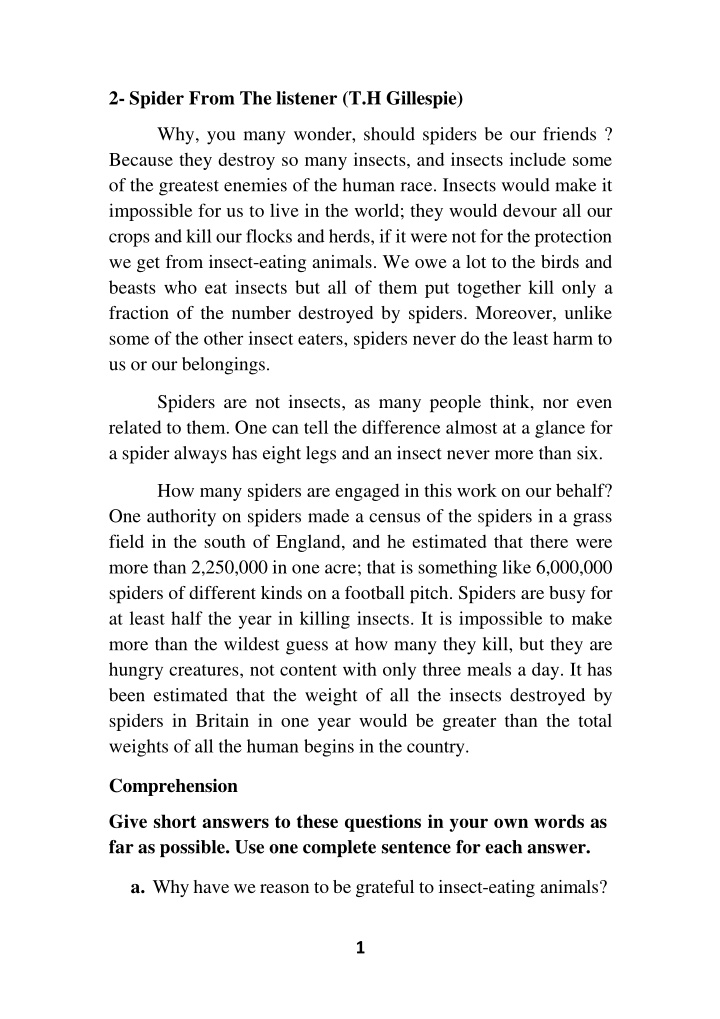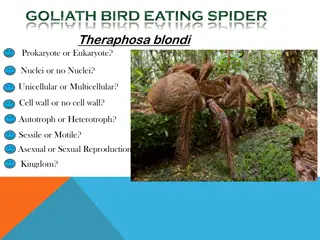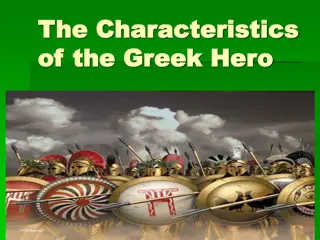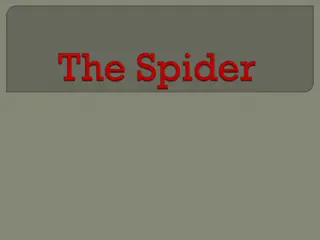Spiders: Tiny Heroes Saving Crops
Spiders play a crucial role in protecting crops from destructive insects, with millions of them working tirelessly to keep insect populations in check. The passage also highlights the pioneering spirit of early climbers who tackled dangerous mountain routes in search of the summit, facing challenges in impoverished Alpine villages. Appreciate the unsung heroes in nature and the fearless adventurers of the past.
Download Presentation

Please find below an Image/Link to download the presentation.
The content on the website is provided AS IS for your information and personal use only. It may not be sold, licensed, or shared on other websites without obtaining consent from the author.If you encounter any issues during the download, it is possible that the publisher has removed the file from their server.
You are allowed to download the files provided on this website for personal or commercial use, subject to the condition that they are used lawfully. All files are the property of their respective owners.
The content on the website is provided AS IS for your information and personal use only. It may not be sold, licensed, or shared on other websites without obtaining consent from the author.
E N D
Presentation Transcript
2- Spider From The listener (T.H Gillespie) Why, you many wonder, should spiders be our friends ? Because they destroy so many insects, and insects include some of the greatest enemies of the human race. Insects would make it impossible for us to live in the world; they would devour all our crops and kill our flocks and herds, if it were not for the protection we get from insect-eating animals. We owe a lot to the birds and beasts who eat insects but all of them put together kill only a fraction of the number destroyed by spiders. Moreover, unlike some of the other insect eaters, spiders never do the least harm to us or our belongings. Spiders are not insects, as many people think, nor even related to them. One can tell the difference almost at a glance for a spider always has eight legs and an insect never more than six. How many spiders are engaged in this work on our behalf? One authority on spiders made a census of the spiders in a grass field in the south of England, and he estimated that there were more than 2,250,000 in one acre; that is something like 6,000,000 spiders of different kinds on a football pitch. Spiders are busy for at least half the year in killing insects. It is impossible to make more than the wildest guess at how many they kill, but they are hungry creatures, not content with only three meals a day. It has been estimated that the weight of all the insects destroyed by spiders in Britain in one year would be greater than the total weights of all the human begins in the country. Comprehension Give short answers to these questions in your own words as far as possible. Use one complete sentence for each answer. a. Why have we reason to be grateful to insect-eating animals? 1
b. How can we tell the difference between a spider and an insect ? c. What do you understand by the statement 'One authority on spiders made a census of the spiders in a grass field.'? Vocabulary Give another word or phrase to replace these words as they are used in the passage: destroy (1.1); devour (1.4); fraction (1.6); belongings (1.8); estimated (1.14). 3- Matterhorn Man (Walter Unsworth) Modern alpinists try to climb mountains by a route which will give them good sport, and the more difficult it is, the more highly it is regarded. In the pioneering days, however, this was not the case at all. The early climbers were looking for the easiest way to the top because the summit was the prize they sought, especially it has never been attained before. it is true that during their explorations they often faced difficulties and dangers of the most perilous nature, equipped in a manner which would make a modern climber shudder at the thought, but they did not go out of their way to court such excitement. They had a single aim, a solitary goal-the top ! It is hard for us to realize nowadays how difficult it was for the pioneers. Except for one or two place such as Zermatt and Chamonix which had rapidly become popular, Alpine villages tended to be impoverished settlements cut off from civilization by the high mountains. Such inns as there were generally dirty and flea-ridden; the food simply local cheese accompanied by bread often twelve months old, all washed down with coarse wine. Often a valley boasted no inn at all, and climbers found shelter wherever they could sometimes with the local priest 2
(who was usually as poor as his parishioners), sometimes with shepherds or cheese-makers. Invariably the background was the same dirt and poverty, and very uncomfortable. For men accustomed to eating seven-course dinners and sleeping between fine linen sheets at home, the change to the Alps must have been very hard indeed. Comprehension Give short answers to these questions in your own words as far as possible. Use one complete sentence for each answer. a. In what way does the attitude of the modern climber towards mountains differ from that of the pioneer ? b. Name three factors which made most Alpine villages inhospitable places. Vocabulary Give another word or phrase to replace these words as they are used in the passage: route (1.1); regarded (1.2); summit (1.4); sought (1.4); faced (1.6); perilous (1.6); shudder (1.17); court (1.8); solitary (1.9); coarse (1.15); boasted (1.15); invariably (1.18). 4- Seeing Hands from the Listener ( Eric De Mauny) In the Soviet Union several cases have been reported recently of people who can read and detect colours with their fingers, and even see through solid doors and walls. One case concerns an eleven-years-old schoolgirl, Vera Petrova, who has normal vision but who can also perceive things with different parts of her skin, and through solid walls. This ability was first noticed by her father. One day she came into his office and 3
happened to put her hands on the door of a locked safe. Suddenly she asked her father why he kept so many old newspapers locked away there, and even described the way they were done up in bundles. Vera's curious talent was brought to the notice of a scientific research institute in the town of Ulyanovsk, near where she lives, and in April she was given a series of tests by a special commission of the Ministry of Health of the Russian Federal Republic. During these tests she was able to read a newspaper through an opaque screen and, stranger still, by moving her elbow over a child's game of Lotto she was able to describe the figures and colours printed on it; and, in another instance, wearing stockings and slippers, to make out with her foot the outlines and colours of a picture hidden under a carpet. Other experiments showed that her knees and shoulders had a similar sensitivity. During all these tests Vera was blindfold; and, indeed, except when blindfold she lacked the ability to perceive things with her skin. It was also found that although she could perceive things with her fingers this ability cased the moment her hands were wet. Comprehension Give short answers to these questions in your own words as far as possible. Use one complete sentence for each answer. a. How did Vera's father accidentally discover that his daughter possessed unusual powers of perception ? b. Under what conditions was Vera incapable of perceiving objects with her skin ? c. Under what conditions did Vera lose the ability to perceive objects with her fingers ? 4
Vocabulary Give another word or phrase to replace these words as they are used in the passage: several (1.1); detect (1.2); vision (1.4); perceive (1.4); curious (1.9); series (1.11); outlines (1.16); a similar (1.7); ceased (1.20). 5- No Room in the Ark ( Alan Moorehead ) The gorilla is something of a paradox in the African scene. One thinks one knows him very well. For a hundred years or more he has been killed, captured, and imprisoned in zoos. His bones have been mounted in natural history museums everywhere, and he has always exerted a strong fascination upon scientists and romantics alike. He is the stereotyped monster of the horror films and the adventure books, and an obvious (though not perhaps strictly scientific) link with our ancestral past. Yet the fact is we know very little about gorillas. No really satisfactory photograph has ever been taken of one in a wild state, no zoologist, however intrepid, has been able to keep the animal under close and constant observation in the dark jungles in which he lives. Carl Akeley, the American naturalist, led two expeditions in the nineteen-twenties, and now lies buried among the animals he loved so well. But even he was unable to discover how long the gorilla lives, or how or why it dies, nor was he able to define the exact social pattern of the family groups, or indicate the final extent of their intelligence. All this and many other things remain almost as much a mystery as they were when the French explorer Du Chaillu first described the animal to the civilized world a century ago. The Abominable Snowman who hunts the imagination of climbers in the Himalayas is hardly more elusive. Comprehension 5
Give short answers to these questions in your own words as far as possible. Use one complete sentence for each answer. a. Why, according to the author, is the gorilla sometimes of a paradox in the African scene ? b. Name three basic facts about the gorilla which Carl Akeley, the American naturalist, failed to find out. Vocabulary Give another word or phrase to replace these words as they are used in the passage: captured (1.2); mounted (1.3); stereotyped (1.5); link (1.6); intrepid (1.9); constant (1.10); indicate (1.15); extent (1.15); elusive (1.19). 6























